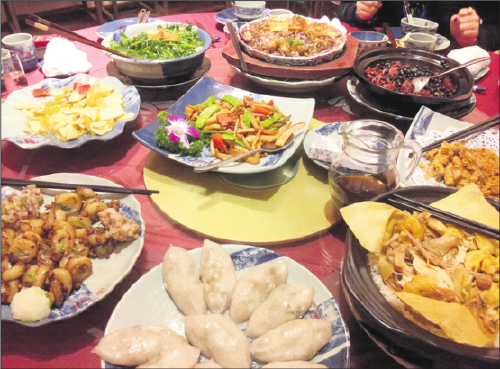
RAYMOND ZHOU
The Hakka food is one of the besttasting cuisines in the country.
Hakka people often find excuses for the lack of presentation for their food, especially compared with their seafood-rich neighbors of Chaozhou and Shantou, where more attention is paid to how dishes are prepared and presented.
For an outsider like me, it is in this area that Hakka food stands out. It may not be the best-looking cuisine in the vast array of Chinese gastronomy, but it is surely a strong contender for the best tasting. It reminds one of the kind of food a mother cooks for her child who is visiting after a long absence from home.
The Hakka idea of feasting is mostly meat. Its salt-roasted chicken has been incorporated into Cantonese cuisine as a standard. The origin of bean curd stuffed with a small meatball goes back to the time before the Hakka moved away from the Central Plains. Unlikely as it seems, this famous dish is a variation of jiaozi, but since wheat was hard to come by in South China, the Hakka had to make do with tofu.
Like its dialect, the Hakka cuisine has traces of their connection to the landlocked north. The emphasis on meat could be a testament to hard times when meat was a luxury and reserved for only the rarest of occasions. But dishes like pork with salted vegetables have gained popularity across the nation. It is, however, pork tripe stewed chicken, among the Hakka staples, that was relatively unknown to me and it proved to be delicious beyond description.
Vegetarians need not despair. Traditionally, much of the Hakka diet is sourced from the earth. It might have been out of necessity, but it has been honed into a culinary art. Tell your host that you prefer a healthy portion of vegetarian food and you'll be surprised at the variety that will greet you and your palate.
The most dramatic part of my trip to Meizhou involved a snack called yanmian, literally pickled noodle. Filmmaker Zhang Yibai, known for his epicurean knowledge, texted us about a noodle shop in downtown Meizhou that had impressed him a year earlier. Our host called every one of his friends and nobody had heard of this place. One night, after we already had dinner and a midnight snack, we were driving around that area and stumbled upon the extremely inconspicuous stall. We ordered one full portion for everyone-yanmian noodle complete with another bowl of fish soup. Xue Xiaolu, director of Finding Mr Right, ended up ordering one more full serving.
That night, I texted a good friend of mine in the United States, whose hometown is Meizhou, about this noodle shop and he replied: "Yanmian is available at every snack stand."
Never predict the flavor of food served by the glamour of the venue, or lack thereof.
Last but certainly not least is Mama's Red Wine, which is my personal translation of "niang jiu" (niang means mother). It is similar to many local Chinese brews but much sweeter. Distilled from sticky rice and well water, it is traditionally brewed by the matriarch of the household.
Nowadays there are plenty of brands and they vary slightly in taste. But invariably they remind me of red wine made from grapes. One sip and I'm transported to the land of hospitality where people may have endured much hardship but have retained their friendly nature.
We recommend:
